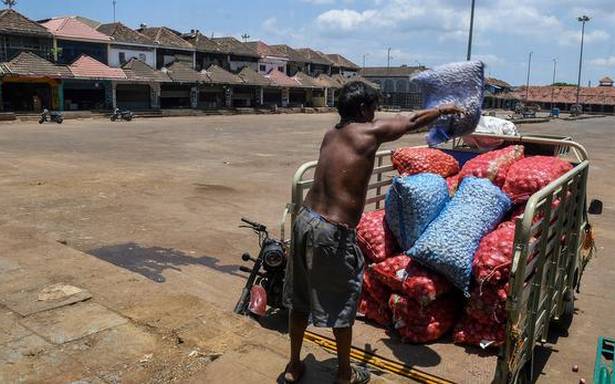The normally bustling Koyambedu market in Chennai, touted to be one of Asia’s largest wholesale hubs for perishable goods, has come to a complete standstill. The never-ending rows of shops are empty, and an eerie silence has descended upon the sprawling area of 65 acres. The iron gates to the market are closed to prevent further spread of the novel coronavirus, but it is too little, too late. Keeping the market open till May 5 during a raging pandemic has proved costly for the Tamil Nadu government.
Instead of maintaining physical distancing, people thronged the market during the nationwide lockdown without wearing masks. As a result, the huge market complex is now the State’s biggest COVID-19 cluster. With cases from the cluster spread over half of Tamil Nadu, Koyambedu has changed the State’s COVID-19 trajectory. Other States too have begun to report COVID-19-positive people with a known presence at Koyambedu, or who had contact with those in the market.
The Hindu Explains | How did the large scale spread happen in Koyambedu?
Since the imposition of the nationwide lockdown, the Koyambedu wholesale complex comprising the vegetable, fruits, flowers and foodgrains market saw sudden surges in the number of visitors every time there was panic about an impending shortage of essential goods. The complex attracts about 1-2 lakh visitors on normal days. Though the number dropped by less than half during the lockdown, there was a steady flow of consumers, In addition, about 10,000 labourers involved in loading and unloading goods flocked to the market.
Rush during lockdown
T. Venkatesh (name changed), a 57-year-old merchant at Koyambedu, was among the hundreds of traders present at the market during the lockdown. “It is impossible not to mingle with people when you’re at the market. I also attended meetings of traders’ bodies until April-end. There was greater rush during a certain period of the lockdown,” he said. A few days later, Venkatesh experienced a bout of fever and cold. “I thought it was normal sickness, but my family thought it would be better if I got tested for COVID-19. Little did I expect that I would test positive for the disease. After the result came on May 2, I was admitted to a private hospital for seven days,” he said. A diabetic, Venkatesh is relieved that he recovered quickly and his family members tested negative for COVID-19.
Like him, many other traders described business during the lockdown period as abnormal. P. Sukumar settled for business on April 25 at the market after unloading produce from the vehicles. Crowds, he said, are not new to him. But what unfolded on that day, before the four-day complete lockdown in Chennai, is etched in his mind. “Normally, retail vendors from distant areas like Arakkonam, Tiruvallur and Gummidipoondi begin to arrive first between 2 a.m. and 3 a.m. to purchase vegetables and other goods. But on that day, people from nearby areas too started coming in early,” he said. Crowds soon spilled over to the roads leading to the market. Generally, about 2,000 vehicles arrive to fetch goods from the market around 2 a.m., but on that day, it seemed like the number of vehicles had doubled, Sukumar said. Inside the market, hundreds of people without masks jostled for space to buy vegetables in bulk. Vendors estimated that the number of visitors was three or four times higher than on normal days.
For residents in the neighbourhood, the Koyambedu market is a popular choice. This is where they can purchase most of the essential goods under one roof at a nominal rate. Traders were not prepared for such an increase in the number of visitors. It is nearly impossible to control such a huge gathering in a market that is the centre of a large supply chain, they said.
Editorial | Pandemic and panic: On Tamil Nadu’s five-city lockdown
Government agencies, including the Chennai Metropolitan Development Authority, Greater Chennai Corporation and the Chennai police, formulated guidelines to decongest the market: they imposed restrictions on vehicle movement and visiting hours; launched mobile vegetable shops to issue passes to visitors; disallowed residents from entering the market; and roped in food aggregators to deliver vegetables and fruits. But none of these measures stopped the crowds from swelling.
Playing the blame game
Soon after the market was closed, and with the number of COVID-19 cases increasing in Tamil Nadu, the blame game for the chaos has started. Chief Minister Edappadi K. Palaniswami has blamed the vendors for not cooperating with the government. He said they refused to move to alternate sites citing business losses, despite several rounds of talks. The Opposition parties have blamed the State government for allowing the creation of this cluster.
D. Rajasekaran, president of the Federation of Koyambedu Wholesale Vegetables Merchants Association, said: “Koyambedu is a large hub of perishable goods where about 90 different items are available. There are several options available now to people, but the market complex’s easy access and affordable rates have always been a big draw. Selling vegetables became an alternative business for several people who were rendered jobless during the lockdown. They also started visiting the market during the early hours despite restrictions by the police.”

Members of traders’ associations said they cooperated with the authorities and spread awareness about COVID-19. They also distributed about 5,000 masks daily to labourers and retail vendors, they said.
Some people said lack of awareness among the labourers on COVID-19 could have caused the rapid spread of the virus. About 10,000 labourers, mainly from other di

